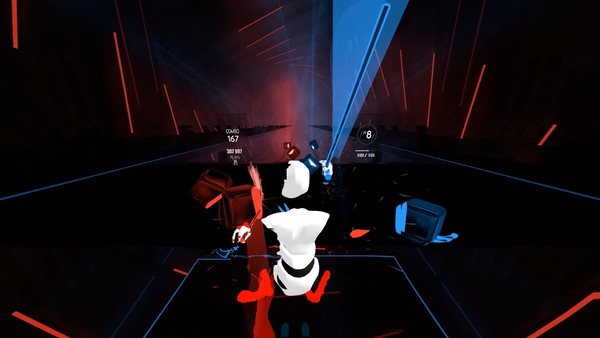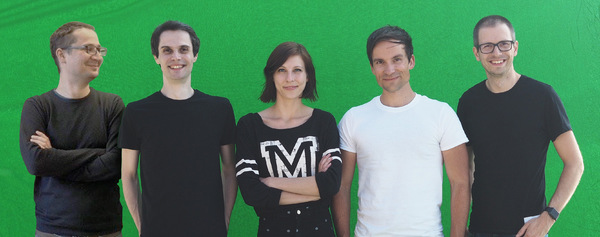Audica and Beat Saber: how to do early access right and wrong
Very rarely do you get such a perfect case study handed to you as with Audica and Beat Saber. Both are early access VR rhythm games on Steam and Oculus, both involve hitting red and blue notes with the correctly-colored weapon carried in each of you hands, and both are damn good fun. Let's take a look at how Audica takes advantage of early access to push content to early adopters while Beat Saber takes advantage of early access to take advantage of users.

First, there was Beat Saber
In May 2018, Beat Saber was released into early access on Steam and the Oculus Store. Before this, there really weren't any good VR rhythm games, and certainly none as flashy and fun as this. It had fancy visuals and great intuitive gameplay that blended Dance Dance Revolution with Fruit Ninja, and was an immediate hit. Within a week it was the highest-rated game on Steam. It launched with a tracklist of ten songs, and promises of much more.
There was a lot of talk and a lot of hype at the time, and this is when I first started playing Beat Saber. And admittedly, it's a lot of fun.
That Sunday the development team posted an announcement on Steam, saying "Soon we will release alfa [sic] version of Level Editor... We will share more info on Friday. #StayTuned." That week saw a small update with some minor bug fixes and added some basic settings (like the ability to adjust audio volume), and on Friday there was indeed another announcement:
We know you have been waiting for todays Beat Saber Level Editor announcement, but the truth is we will need some more time for this new feature. Several technical issues has occurred and we can’t guarantee you it will be finished this week
(If the English seems broken in all their announcements, it's because the team is from the Czech Republic).
That was May 11, 2018, over a year ago. The development team never mentioned anything specific about the level editor again. Fortunately, the community did the devs' jobs for them and released their own editors, but they shouldn't have had to.
In the next month after that announcement there was exactly one bug fix for a single bug, and total radio silence until June 18.
The team posted new announcement (in much better English, curiously), full of generic platitudes thanking the community and assuring us they're hard at work. They claimed to still be working on the level editor, although there weren't any specifics, music licensing, a PS VR demo for E3, social media and marketing, "new offices, accounting, contracts, invoices payments... you name it."
The next week, the team published another post that said they would start working on a multiplayer mode after releasing the level editor. This is the last time we hear about multiplayer. Does this sound familiar? Red flags should be going off in your head. Just wait, it keeps getting better.

Another month passes. On July 19 they add a new song. That's right, in two and a half months of development in early access all the dev team made was one new song map (bringing the total to a whopping eleven), and a bunch of empty promises.
The next real update wasn't until November 26, almost seven months after the game's release. This added Expert+ difficulty to all songs (a nice addition, but something community-made maps had had for months), some basic modifiers like "faster song" and "no arrows," and some graphical updates.
December added two new songs, and March added five more. However, the March update also added a ten-track paid DLC album. That's right, after ten months of doing basically nothing to update what is still an early access game, the developers have the audacity to ask for more money. The game has sold over one million copies and still has rave reviews, so it's not like they're short on cash.
Why it's so frustrating
I'd love to be able to write off Beat Saber as a good idea handled by incompetent developers and move on to something better, but that's the problem—there is nothing better.
No other VR game has captured the sheer satisfaction of precisely slicing through hundreds of blocks in a matter of seconds the way Beat Saber has. Beat Saber isn't just one of my favorite VR games, it's one of my favorite games, period. Other rhythm games don't even compare to it. That's why it's such a shame that Beat Games, its studio, has completely abandoned it.
But there is a silver lining to this depressing story. A recent challenger might be just what is needed to force Beat Games out of their complacency and get back to work.
Enter Audica
In March 2019, just a week before Beat Saber's DLC went live, Harmonix released Audica on Steam and Oculus. You might remember them as the developers behind Guitar Hero and Rock Band. In Audica you have colored guns instead of colored swords, and shoot targets instead of slicing them, but the basic idea is the same.
Sensing that this could be the answer to my Beat Saber woes, I bought Audica the day it launched. I had a few minor complaints, but mostly liked it. What really sealed my love of the game was the first patch, which came just 24 hours after release and fixed every problem I had with it. Like Beat Saber, Audica also launched with a ten song tracklist. But within a week that number had climbed to twelve, and by April there were 14.
On April 10 Harmonix released documentation and software for creating custom maps. That's right, they managed to make a level editor first despite Beat Games having an eleven month head start. Oh, and they added two new songs a week later.
What happens now?
The point is that Audica's time in early access has been full of development, new features, free new content, and tools the community actually wants. Beat Saber's early access has been... not that. I understand that Harmonix is an established studio with money and connections, but Beat Games has also been getting tons of money and free publicity thrown at them this whole time.
My hope is that the entry of Harmonix into the VR rhythm game world will end up being good for everyone. In the short term it means we get access to more choice in what games to buy, and in the long term the competition might stimulate Beat Games to actually fulfill some of the promises they made last year.
I'll freely admit that Beat Saber is a better game than Audica. Slashing flying blocks is way more visceral and satisfying than shooting targets. But I'm glad Audica is around, as an enjoyable in its own right game and as a vehicle to push Beat Saber to be better.